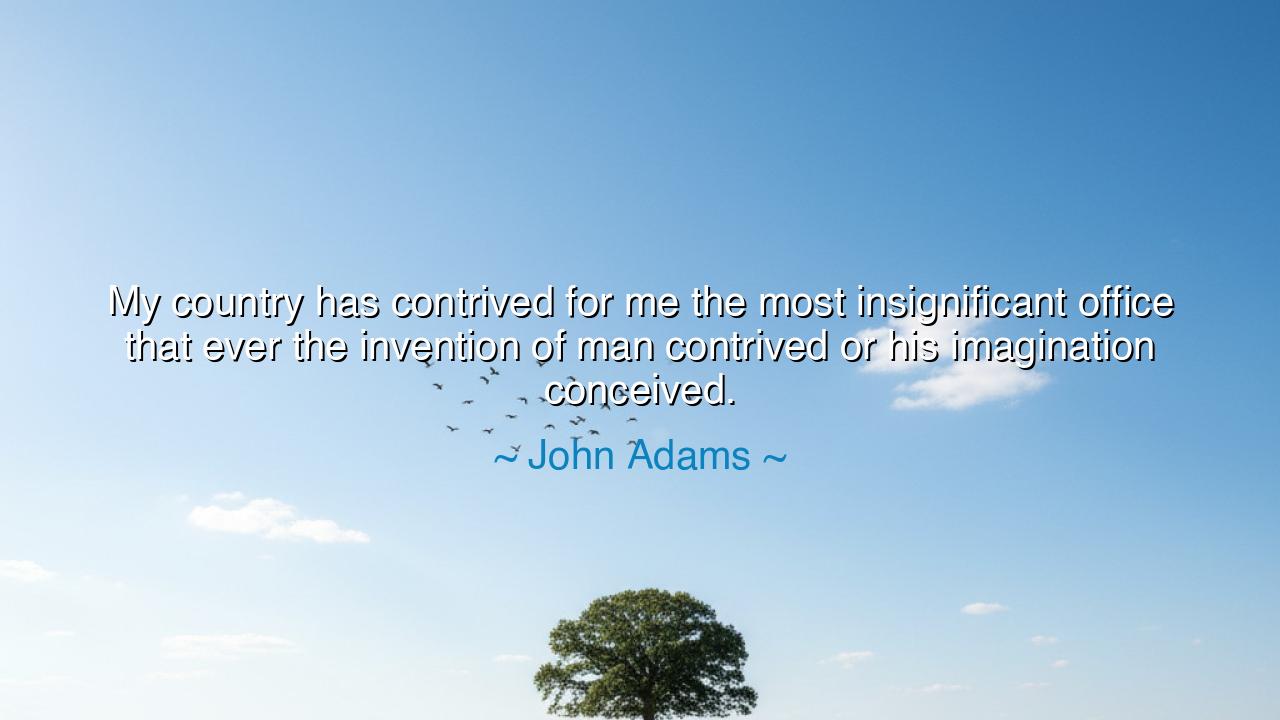
My country has contrived for me the most insignificant office
My country has contrived for me the most insignificant office that ever the invention of man contrived or his imagination conceived.






When John Adams lamented, “My country has contrived for me the most insignificant office that ever the invention of man contrived or his imagination conceived,” he spoke not merely as a statesman, but as a man of profound reflection, wearied by the strange burdens of glory. These words, spoken during his time as Vice President of the United States, reveal both humility and frustration. Adams—brilliant, eloquent, and fiercely devoted to the new Republic—found himself seated in a position that carried honor but little power. To him, the Vice Presidency was a title without authority, a name without a purpose. It was, in his view, a creation of politics rather than necessity, a symbolic office contrived by men’s imagination to appease balance rather than to serve action.
The origin of this quote lies in the early years of the American Republic, when the founders sought to build a government both strong and restrained. Adams, once a fiery revolutionary and the first ambassador to Great Britain after independence, now found himself constrained by formality. The Vice President presided over the Senate but could not speak unless casting a vote to break a tie. He was close to power yet forbidden to wield it. For a man of his intellect and passion, it was a torment of stillness—a life of ceremony rather than creation. Thus, in this moment of candor, he confessed that his office was the most “insignificant” ever conceived by the imagination of man, for it gave the illusion of importance without the substance of influence.
Yet, Adams’s lament speaks to something deeper than politics—it speaks to the eternal struggle between title and purpose, between what men appear to be and what they are permitted to do. Many in history have borne noble titles only to find them empty, while others, with no title at all, have shaped the world through quiet power. Adams’s complaint was not of pride alone, but of longing: he wished to serve meaningfully, to contribute his wisdom to the founding of the nation he helped create. To be rendered ceremonial was, to him, a kind of living death. In his words, we hear the cry of every soul who has been given honor without responsibility, recognition without the freedom to act.
Consider the example of Cincinnatus, the Roman farmer called from his plow to save the Republic. Given absolute power as dictator, he defeated the enemy and then, rather than grasping for glory, returned to his fields. His office, though brief, was filled with meaning because it was an act of service. Adams’s lament can be seen as the inverse of this tale: a man of immense ability confined to an office that allowed no deed worthy of his character. In this irony lies the wisdom of humility—that the measure of one’s greatness is not found in the grandeur of one’s office, but in the purpose one brings to it.
Yet Adams did not remain bitter. Over time, his reflection on insignificance gave birth to understanding. He saw that even an “insignificant office” could carry symbolic weight—that the appearance of unity in the Republic mattered as much as the exercise of power. His patience in that humble position prepared him for the far greater trials that awaited him as President. For those who endure limitation with integrity, the moment of true responsibility will come. The seed planted in obscurity will one day rise to meet the sun. Thus, what he called “insignificant” became, in retrospect, a test of endurance, a lesson in restraint, and a preparation for leadership.
There is in Adams’s reflection a lesson for all who labor in unnoticed places. Many will find themselves in roles that seem small, their efforts unseen or their talents unused. But significance is not bestowed by title—it is born of character. The imagination of man may invent hierarchies, but the heart of service gives them meaning. A humble role, filled with honesty and dedication, outshines a mighty office devoid of purpose. The ancients taught that the noblest man is he who serves well, even when the world does not see him. Adams’s lament, therefore, becomes not a complaint but a warning—to seek worth in action, not in recognition.
So, my listener, take this wisdom to heart: the dignity of your life does not depend on the size of your office or the splendor of your title. It depends on the imagination with which you fill your days, the passion with which you serve, and the integrity with which you bear even the smallest burden. If the world gives you an “insignificant office,” make of it something significant through the greatness of your spirit. For the truest measure of power lies not in authority, but in purpose—and in that, no office is too small, and no soul too humble, to shape the destiny of nations.
Thus, as John Adams teaches, even an office born of man’s limited imagination may yet become the stage upon which the strength of character reveals its grandeur. The wise do not seek importance—they create it. And those who endure insignificance with patience shall one day find that every act of quiet service was, in truth, the foundation of something immortal.






AAdministratorAdministrator
Welcome, honored guests. Please leave a comment, we will respond soon